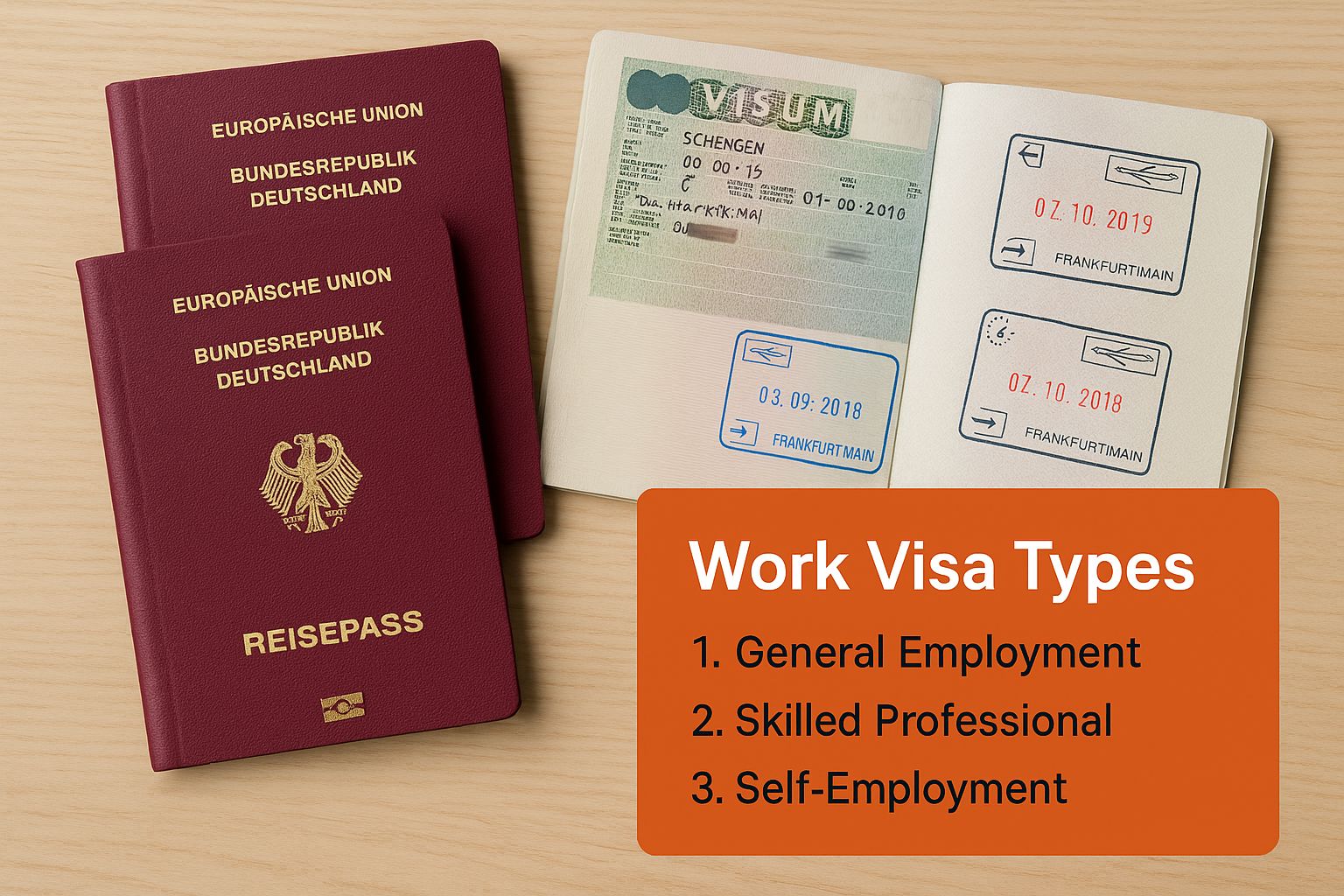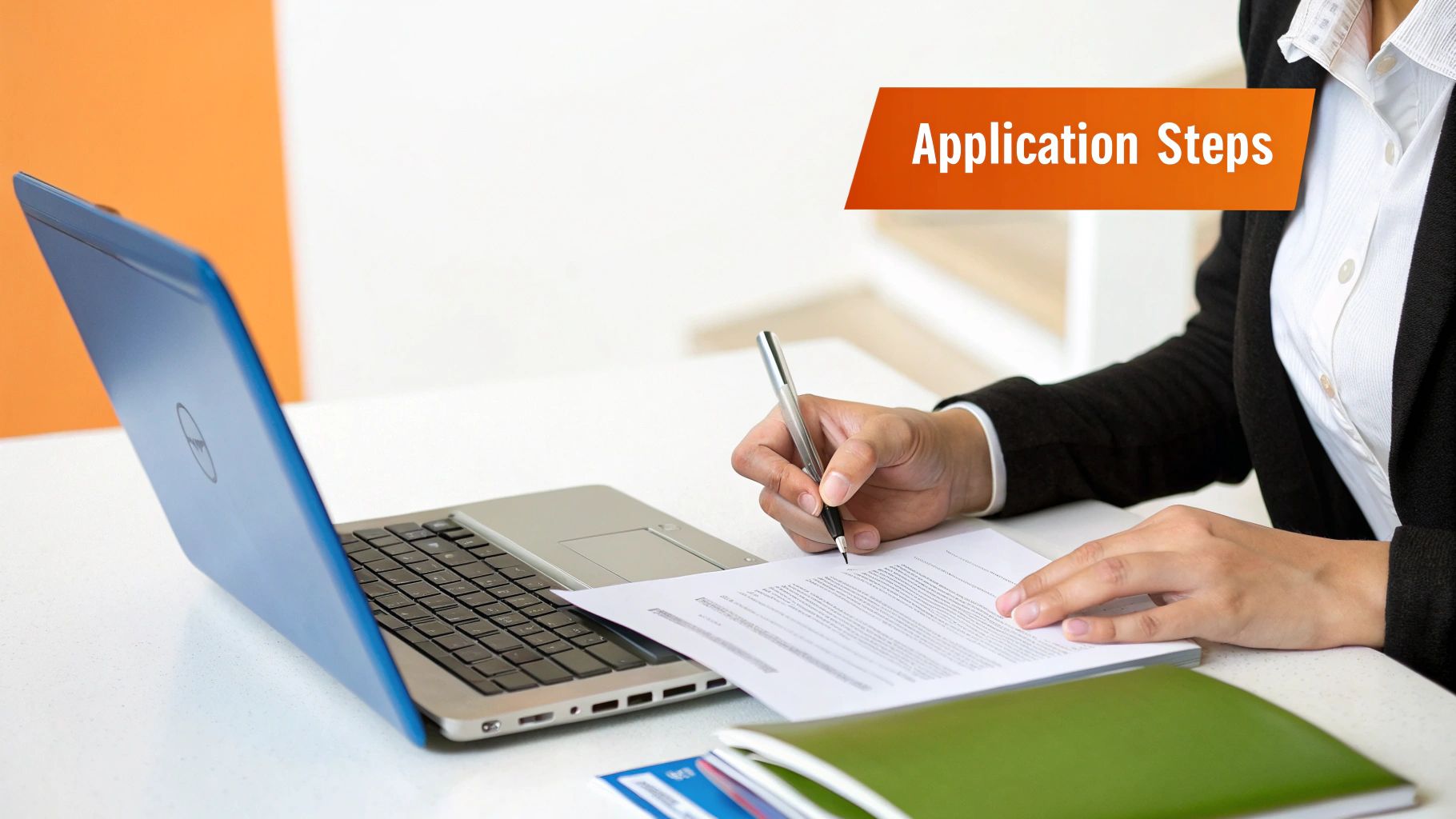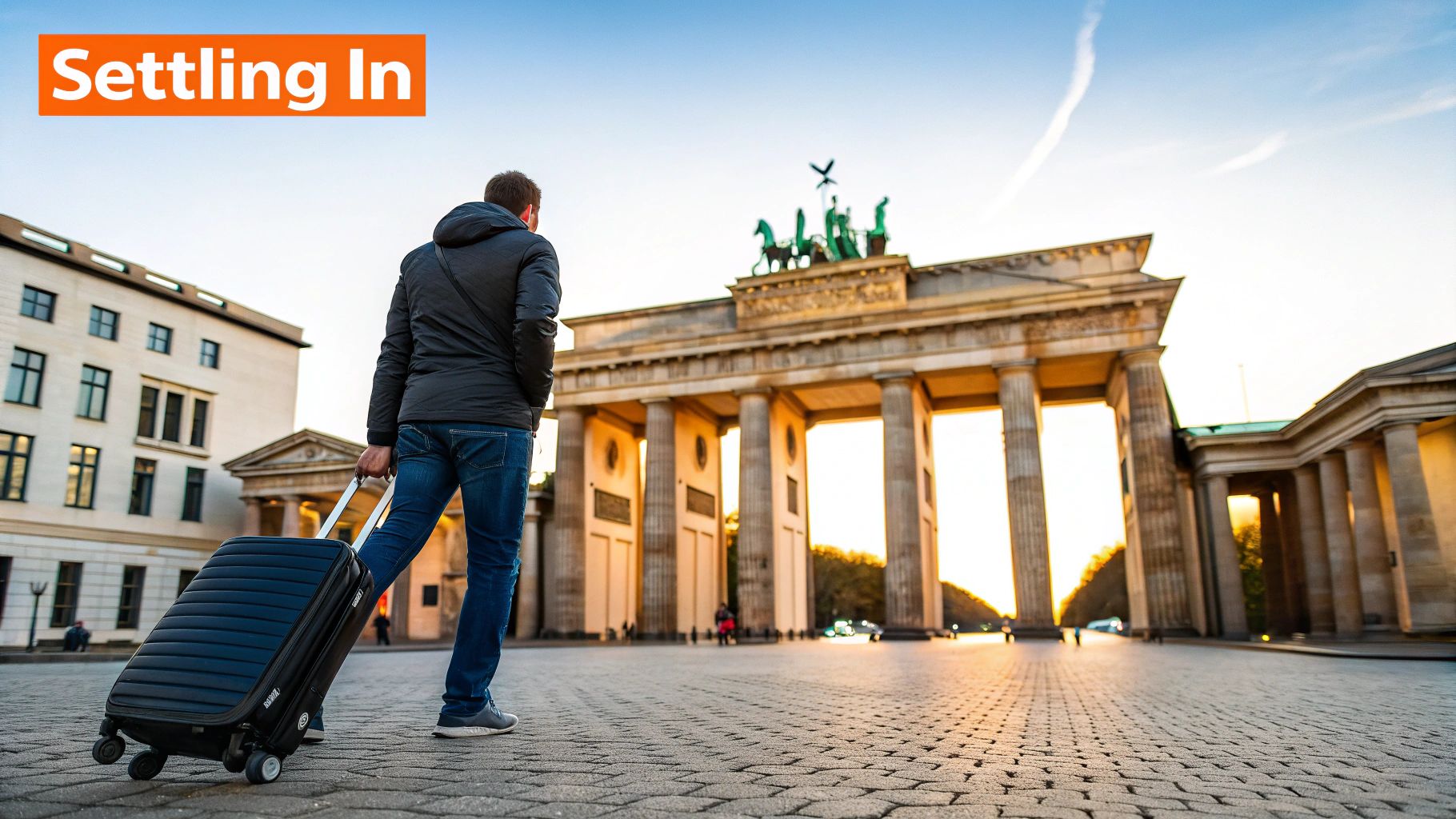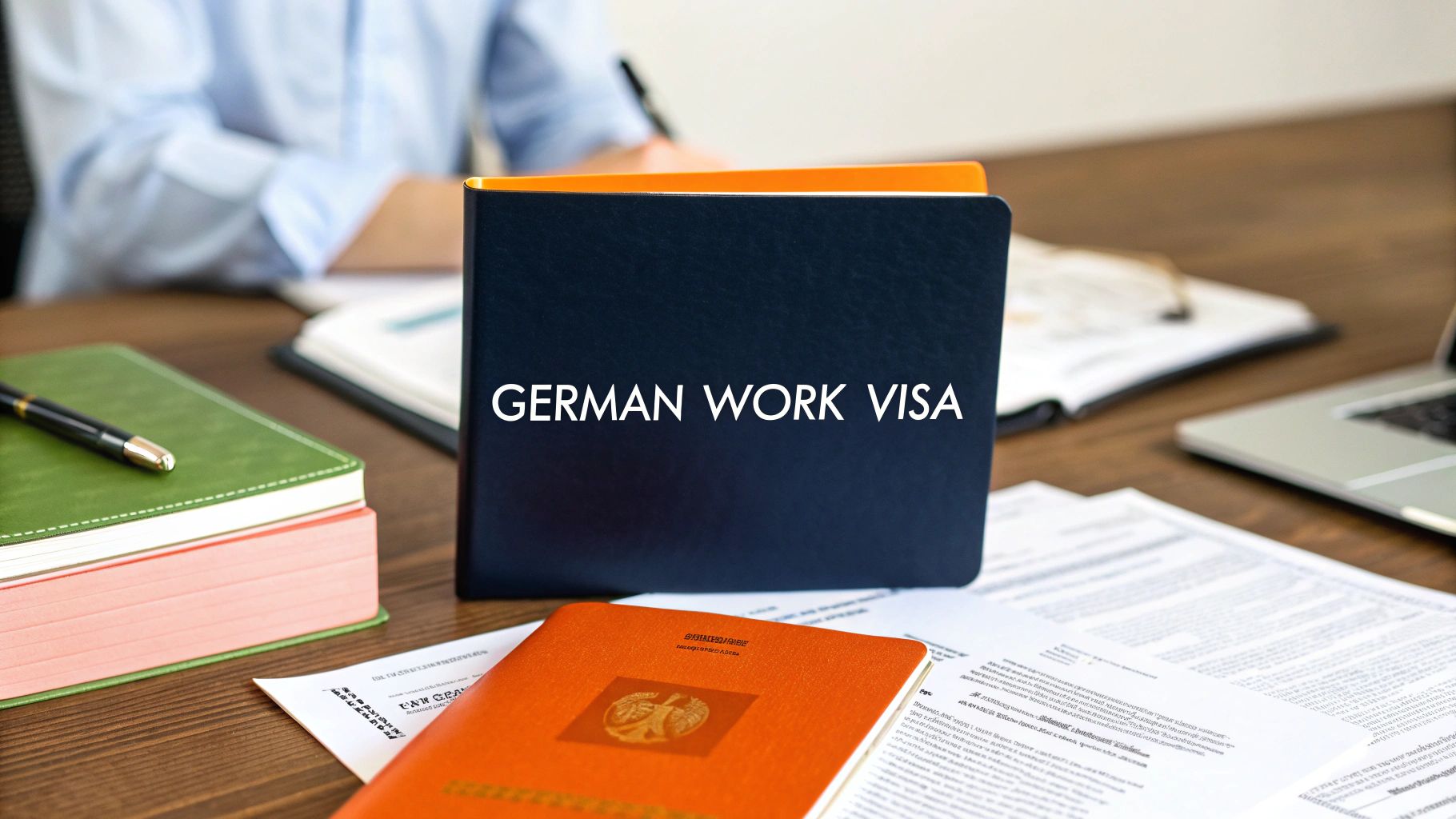Before you even think about filling out a single form for a German work visa, there’s one non-negotiable prerequisite you must have: a signed employment contract. This isn't just a piece of paper; it's the key that unlocks the entire application process. Without it, you simply can't move forward.
Getting Started: The Job Offer Comes First
Let's be clear: the German system is built for professionals who have already found a job. It’s not a "chicken and the egg" scenario. You secure the employment offer, and then you begin the visa journey.
Once you have that contract in hand, your next move is to figure out which visa pathway is right for you. For most skilled professionals coming from outside the EU, it boils down to two main options: the EU Blue Card or the Work Visa for Qualified Professionals. They both lead to a life working in Germany, but they're designed for different circumstances. Making the right choice from the outset will save you a lot of headaches down the road.
Choosing the Right Visa for Your Profile
The EU Blue Card is essentially Germany's premier visa for highly qualified talent. It's geared towards individuals with a university degree and a job offer that meets a pretty specific salary benchmark. Think of it as a fast-track route, as it often leads to permanent residency much quicker than other visas.
The Work Visa for Qualified Professionals, on the other hand, is a bit more accommodating. It’s open to people with either a university degree or a recognised vocational qualification. The salary requirements are more flexible here, but the crucial part is getting your foreign qualification officially recognised as equivalent to its German counterpart.
For many foreign nationals, landing that job offer is the biggest hurdle. But the opportunities are certainly there. Germany currently has around 639,000 job vacancies, with a serious need for talent in fields like IT, healthcare, engineering, and finance. If you're a salaried professional in one of these high-demand sectors, you might even qualify for a reduced minimum salary requirement for your visa, which currently stands at €43,759.80. You can find more details on the German work permit criteria for 2025 to see how these figures might apply to your situation.
My Advice: Don't waste time or energy on visa paperwork until a German employer has given you a firm, written job offer. This is the foundational step that dictates everything else.
The image below gives a great visual summary of how the main work visa types stack up against each other.

This helps clarify which visa aligns best with your professional background and salary. To make it even clearer, let's break down the two primary options side-by-side.
Key German Work Visa Types at a Glance
This table offers a quick comparison of the main work visa options for non-EU skilled professionals, highlighting the core requirements and benefits of each.
| Visa Type | Primary Requirement | Minimum Salary Threshold | Path to Permanent Residency |
|---|---|---|---|
| EU Blue Card | University degree + job offer | €45,300 (2024) | After 33 months (or 21 with B1 German) |
| Work Visa for Qualified Professionals | Recognised university degree or vocational training | No set minimum, must be comparable to local salaries | After 4 years |
As you can see, the EU Blue Card is faster but has stricter salary and education requirements, while the Work Visa for Qualified Professionals is more flexible, especially for those with vocational training.
Nailing the Eligibility and Qualification Requirements
Before you even think about booking a visa appointment, let's get one thing straight: understanding what German authorities look for is the single most important step. This isn't just about having a job offer in hand. It’s about proving your professional qualifications are recognised in Germany and that your job meets their specific criteria.
Let's break down exactly what that means for you. Getting this right from the start will save you a world of headaches, time, and money down the road.
Is Your Profession Regulated?
First things first, you need to figure out if your profession is "regulated" or "non-regulated" in Germany. This distinction is critical and dictates your next steps.
-
Regulated Professions: Think of jobs where public safety or health is paramount—doctors, lawyers, engineers, and teachers fall into this category. To work in one of these fields, you absolutely must have your foreign qualifications officially recognised. This isn't optional; it's a legal requirement to get a licence to practise, and without it, your visa application is a non-starter.
-
Non-Regulated Professions: This covers the vast majority of other roles, especially in tech, marketing, or business. For these jobs, official recognition isn't mandatory for the visa itself. However, don't dismiss it. Having a formal assessment of your degree can seriously boost your application's credibility and make you a more attractive candidate to employers.
My Two Cents: For regulated jobs, qualification recognition is mandatory. For everything else, think of it as a powerful tool that validates your expertise and makes the visa officer's decision much easier.
Getting Your University Degree Recognised: Anabin and the ZAB
If you hold a university degree from outside the EU, two acronyms will become your best friends: Anabin and ZAB.
Your first port of call should be the Anabin database. This is a free online portal run by the German government that lists foreign universities and degree types. If you find your university listed as "H+" and your degree programme is also recognised, you're in luck. Simply print out these pages and include them with your visa documents. For most non-regulated professions, this is often sufficient proof.
What if your university or degree isn't on Anabin? Don't panic. This is where the ZAB (Zentralstelle für ausländisches Bildungswesen), or the Central Office for Foreign Education, comes in. You'll need to apply for a Statement of Comparability. It's a paid service, but the official document you receive confirms how your degree stacks up against a similar German qualification. Honestly, this statement is gold—it removes any doubt about your credentials.
Talking Money: The Salary Thresholds
Your salary is more than just your income; it’s a key piece of the visa puzzle, particularly if you're aiming for an EU Blue Card.
As of 2024, the standard minimum gross annual salary for an EU Blue Card is €45,300. This figure acts as a benchmark to ensure the role is genuinely for a "highly-qualified" professional.
However, Germany is actively seeking talent in certain high-demand fields, known as "shortage occupations." This list includes professionals in IT, engineering, mathematics, natural sciences, and human medicine. If your job falls into one of these categories, the salary requirement drops to €41,041.80 (2024 figure).
For the standard Skilled Worker Visa, there isn't a hard-and-fast minimum salary. Instead, the rule is one of "comparability." Your salary must be similar to what a German employee would earn in the same position and region. The Federal Employment Agency (Bundesagentur für Arbeit) will check your contract to make sure the pay and conditions are fair. To get a better feel for this, you can dive into our complete guide on German work visa requirements.
By systematically checking your profession type, validating your qualifications, and ensuring your salary hits the mark, you're building a rock-solid case. This shows the German authorities you've done your homework and are the kind of prepared, skilled professional they want.
Putting Together Your Flawless Visa Application Package

This is where the rubber meets the road. A successful German work visa application comes down to being incredibly thorough and detail-oriented. Every single document you gather is a crucial piece of the puzzle, and with German bureaucracy, there's simply no room for error. A complete, perfectly organised application isn't just a good idea—it's non-negotiable.
Think of it this way: you're building a legal case for why you should be allowed to live and work in Germany. You need to present clear, undeniable proof that you meet every single requirement. That means no missing paperwork, no typos on your forms, and zero ambiguity.
The Core Document Checklist
While the exact list can differ slightly from one consulate to another, there's a standard set of documents that form the heart of almost every German work visa application. Getting these in order right from the start will save you a world of headaches later.
- Your Valid Passport: This needs to be valid for at least six months beyond your intended stay and must have at least two blank pages.
- The National Visa Application Form (D-Visa): You'll need two completed and signed copies. Fill this out with painstaking care; every detail must perfectly match your passport and employment contract.
- Biometric Passport Photos: Get two recent, identical photos. These have to meet very strict German specifications, so I always recommend having them done by a professional who knows the requirements.
- A Signed Employment Contract: This is the absolute centrepiece of your application. The contract has to be from a German employer and must clearly spell out your role, salary, and the duration of your employment.
- Proof of Your Qualifications: This means your original university degree certificates and any relevant transcripts. If you confirmed your degree's recognition using the Anabin database, include those printouts. If you went through the process to get a Statement of Comparability from the ZAB, that official document is what you need.
- A Detailed CV (Lebenslauf): Your CV should be professional and outline your entire academic and professional journey in chronological order.
Gathering these items is your first big mission. One of the most common mistakes I see is people underestimating how long it takes to get official copies or certified translations. My advice? Start on this immediately.
Supporting Documents You Absolutely Cannot Forget
Beyond that core list, several other documents are needed to give the authorities a complete picture. These are just as vital, and frankly, they're often where applications fall apart.
Proof of Health Insurance
You must have valid health insurance coverage starting from your very first day in Germany. For the application, you'll need a confirmation letter from an insurance provider that is recognised in Germany. This can't be simple travel insurance; it needs to be a proper German health insurance plan, either public (gesetzliche Krankenversicherung) or private (private Krankenversicherung).
Proof of Financial Stability
Even with a job offer in hand, you might need to show you can support yourself when you first land, before that first paycheque arrives. Usually, recent bank statements will do the trick. For anyone moving without an immediate income, a blocked account (Sperrkonto) may be required.
Certified Translations
Pay close attention to this one. Any official documents not in German or English—think university diplomas, birth certificates, etc.—must be translated by a certified translator. Don't even think about translating them yourself. The consulate will only accept official, certified versions.
Expert Insight: From my experience, the single biggest reason for visa delays is an incomplete application. Go to the website of your local German consulate, find their specific checklist, print it out, and physically tick off each item only when you have the correct document in your hands.
The "Erklärung zum Beschäftigungsverhältnis" Form
This is a critical supplementary form your employer has to fill out and sign. It's an official declaration that gives the German authorities specific details about your job that might not be in the standard employment contract. Make sure your employer completes this with total accuracy.
Before you even get to this stage, it's a smart move to check out our guide on how to find work in Germany. Having a solid, compliant job offer makes putting this package together infinitely smoother. A meticulously prepared application doesn't just meet the formal requirements; it sends a clear signal to the visa officer that you are a serious, organised, and well-prepared professional.
Your Embassy Appointment and What Comes Next
You've done the hard part and put together a solid application package. Now, it's time to navigate the final hurdles: your embassy appointment, the interview, and the first crucial steps you'll take once you land in Germany.
Booking that appointment at your local German embassy or consulate can be a real test of patience. In busy locations, slots often get snapped up months in advance. My best advice? Book your appointment the moment you have your signed employment contract. Don't wait until you have every single document in hand, or you could be looking at significant delays.
What to Expect During Your Visa Interview
Think of the visa interview less as an interrogation and more as a simple verification chat. The consular officer has one main job: to make sure you are who you say you are and that your application is legitimate. They'll have your entire file right there, so your answers should match the information you've provided.
Expect them to ask about your new job, the company you'll be working for, and your professional background. Be ready to talk about your qualifications and what makes you the perfect fit for this role in Germany.
A Real-World Scenario: Let's say the officer asks, "Why you? Why did this German company hire someone from abroad?" A confident, specific answer goes a long way. You could say, "My five years' experience in backend development, specifically with Python and cloud infrastructure, was a perfect match for the senior software engineer role they advertised. We spent a lot of time in the interviews discussing a project I led at my last job, which is remarkably similar to the system they're currently building."
An answer like this immediately connects your experience to their need, which is exactly what the officer is looking for. During this appointment, you’ll also provide your biometric data—they’ll take your fingerprints and a digital photo.
From Interview to Decision: A Realistic Timeline
Once your interview is done, the waiting game begins. How long it takes can vary wildly, from just a few weeks to several months, depending on the embassy's workload and the time of year. A good rule of thumb is to plan for one to three months.
What’s happening behind the scenes? Your application is usually sent to the local Foreigners' Authority (Ausländerbehörde) in the German city where you'll be working. This office, often in cooperation with the Federal Employment Agency, gives your file a final review before the decision is made. It’s a thorough process, so patience is key here.
This diligence is all part of Germany's bigger picture to attract and properly integrate skilled professionals. With around 400,000 jobs to fill, the country is actively looking for qualified people. To tackle these shortages, the government recently announced plans to issue 22,422 extra work visas, bumping up the total allocations by about 10%. Projections now suggest Germany will issue close to 200,000 work visas each year. You can read more about these updates in the German government’s latest announcements for skilled workers.
The Final Steps After Landing in Germany
Getting your entry visa is a massive relief, but you’re not quite at the finish line. This initial visa gets you into the country, but you need to convert it into a full residence permit once you've arrived.
As soon as you touch down, focus on these two immediate priorities:
-
Register Your Address (Anmeldung): You have 14 days from when you move into your new flat to register your address at the local citizens' office (Bürgeramt). This process, called Anmeldung, is a non-negotiable legal requirement for anyone living in Germany. You'll walk out with a registration certificate (Anmeldebestätigung), a document you'll need for almost everything else.
-
Apply for Your Residence Permit: With your Anmeldung certificate in hand, your next stop is the local Foreigners' Authority (Ausländerbehörde). You'll need to book an appointment to swap your entry visa for a proper residence permit (Aufenthaltstitel). This will be a biometric card that officially confirms your right to live and work in Germany.
Taking care of these tasks right away will set you up for a smooth and legally sound start to your new life in Germany.
What Your German Work Visa Really Means for Your Future
Getting your German work visa is a huge milestone, but it's much more than just a stamp in your passport. Think of it as the foundation for your new life and career in one of Europe’s strongest economies. Your journey doesn't stop here; it's actually just getting started.
The perks go well beyond your job contract. The German system is built to provide a clear, structured path towards long-term stability. This isn't just a temporary pass; it's a genuine stepping stone.
The Path to Permanent Residency
Germany genuinely wants skilled professionals like you to stay for the long haul. The route to getting a settlement permit (Niederlassungserlaubnis), or permanent residency, isn't some confusing, far-off dream—it’s a clearly defined process. If you hold a standard work visa, you can typically apply after just four years of living and working here.
It gets even better if you have an EU Blue Card. With a Blue Card, you can apply for permanent residency in just 33 months. But there's a fast track.
Germany's system is designed to reward integration. Visa holders get a direct line to permanent residency, spouses get full working rights, and everyone gets to travel freely within the Schengen Area. It's a clear signal that the country is serious about attracting and retaining skilled talent. For more on this, check out Germany's structured approach to skilled migration on centuroglobal.com.
The quickest way to secure your future here is by learning the language. If you can prove your German has reached the B1 level, the waiting period for Blue Card holders plummets to an incredible 21 months. This is a massive incentive to hit the language books early—it directly fast-tracks your long-term security.
Bringing Your Family to Join You
From my experience, I can tell you that Germany's immigration policies are refreshingly family-friendly. They understand that you can’t fully settle into your professional life if your personal life is on hold. Once your residence permit is sorted, you can start the family reunification process to bring your spouse and children over.
This means your family can truly build a life here together. Your kids get access to Germany's excellent education system, and the rights granted to your spouse are particularly generous.
Here’s what your spouse can expect:
- An Unrestricted Work Permit: This is a big one. Unlike in many other countries, your spouse's residence permit usually comes with the right to work in any field, for any employer, without needing their own visa sponsorship.
- Freedom to Study or Launch a Business: Their permit also gives them the flexibility to enrol in a university or even start their own company, empowering them to chase their own career ambitions.
This thoughtful approach makes a world of difference for the whole family's transition. To get a better sense of day-to-day life, you might find our guide on working in Germany as a foreigner helpful.
Travel Freely Across Europe
Your German residence permit also doubles as a golden ticket for travel. You get visa-free access to the entire Schengen Area, a zone of 27 European countries with no internal border checks.
So, go ahead and plan that weekend getaway to Paris, a ski trip to the Austrian Alps, or a tour of Prague's historic centre. You can do it all without the headache of applying for more visas. This freedom to explore turns your move to Germany into a gateway to the rest of Europe, right on your doorstep.
Common Questions About the German Work Visa

Even with the best preparation, the German visa process can throw a few curveballs. Let's walk through some of the most common questions we hear from applicants. Getting these answers straight from the start can save you a lot of headaches down the road.
Can I Apply Without a Job Offer?
This is easily the question I get asked most often. For almost all German work visas, including the EU Blue Card, the answer is a firm no. You absolutely need a concrete job offer backed by a signed employment contract.
The one major exception is the Job Seeker Visa. This is a totally different visa type that lets you come to Germany for up to six months purely to search for a job. Once you land a position, you'll still need to go through the process of applying for a proper work visa or residence permit before you can start.
How Long Does the Application Process Take?
Here's where things get a bit unpredictable. The time it takes to process your visa application really depends on the German embassy or consulate in your country and how busy they are.
As a rule of thumb, you should budget for one to three months from your appointment date. I've seen it take longer, especially during peak travel seasons or for more complicated cases. The single best piece of advice I can give is to apply as early as possible. Don't let processing delays jeopardise your start date.
A crucial point many people miss is that your salary must be in line with what a German citizen would earn for the same job. There isn't a single magic number, but knowing the local market rates is vital. For more on this, check out our guide on how to approach salary negotiation in Germany to ensure your offer strengthens your visa application.
What Happens If My Visa Application Is Rejected?
Seeing a rejection notice is tough, but it doesn't have to be the end of the line. The embassy will send you a formal letter, called a Remonstrationsbescheid, which spells out exactly why your application was denied.
You have the right to appeal within one month. This involves writing a formal letter back to the embassy where you address their concerns point-by-point, clearing up any confusion or supplying missing documents. Your other option is to simply fix the issues they raised and submit a fresh application from scratch.
Do I Need to Speak German for a Work Visa?
While it makes life in Germany infinitely easier, fluent German is not always a strict requirement for the visa itself. This is particularly true in sectors like IT or at large international firms where the day-to-day working language is often English.
However, having German skills gives you a massive advantage. For those with an EU Blue Card, proving you have B1-level German proficiency fast-tracks your permanent residency application, cutting the waiting period from 33 months down to just 21. It’s a powerful incentive that makes learning German a smart career move.
Navigating the visa process and German job market can feel overwhelming. If you could use some one-on-one advice from professionals who know the system inside and out, iknowly is here to help. We connect you with verified experts in Germany for personalised consultations on everything from perfecting your CV to demystifying visa requirements. Get the clarity you need by booking a session at https://www.iknowly.com.

Leave a Reply